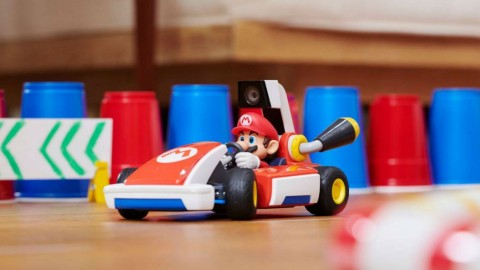
“If it goes badly, you look like a twat – and I do not want to look like a twat.”
Mike Rose, journalist turned game publisher, self-described “egotistical maniac”, and among the more outspoken members of British games Twitter, doesn’t sound like most industry figureheads.
You only have to follow his Twitter account to see that. Whether he’s calling out notorious digital game store G2A for reselling stolen game keys (repeatedly), challenging players’ and journalists’ notions of how much of a game you need to play to review it, or knocking down industry assumptions about the financial impact of new subscription services like Xbox Game Pass, Rose isn’t afraid to adopt an unpopular position and tweet it to high heaven.
His unusual outlook goes beyond the Twittersphere and into the way he runs No More Robots. He founded the Manchester-based game publishing label with a mission to create a publisher free of the impersonal, callous approach to the people who actually make games that he’d experienced elsewhere.

Chatting to him in his home office over a Zoom call, it’s clear that this is more than just a bit of fluff for the company website, and that he sees publishing games as an unexpectedly personal endeavour, from his relationships with the developers he works with to the types of games he signs.
It all comes down to the fact that while No More Robots may not bear his name, Rose knows that the company, and its games, are associated closely with him. And he puts the problem plainly enough: “I don’t want a shit game attached to my name.”
So, how does he avoid that? In an industry often driven by the rush not to find the next big thing, but to replicate the last big thing, No More Robots stands out by launching games that rarely fit neatly into established genres.
“I want to give people weird stuff that they’ve never played before,” Rose explains. “What’s the point of publishing games that anyone can publish?”

No More Robots’ biggest game to date is Descenders. A downhill mountain biking game where pulling off tricks earns you points might not sound too out there – but by procedurally generating every level on the fly, developer RageSquid managed to fuse the core of a classic extreme sports game with the endless replayability of the modern roguelike genre, and with it the challenging notion that the game can never truly be mastered.
Descenders is only the tip of the iceberg though, and No More Robots gets an awful lot weirder than that, from Brexit-themed bouncer simulator Not Tonight to Hypnospace Outlaw, in which you scour the late ‘90s internet for bad netizens to apprehend.
“It’s quite likely that if you’re going to play one of our games, it’s going to be messed up in some way,” Rose suggests. “You’re going to want to talk to someone else about it afterwards. You’re gonna need to talk to someone to explain to them and they’re going to stare at you like, ‘The fuck are you talking about?’ But you just need to say it. Because it’s messed with you in some strange way.”
“I want to give people weird stuff they’ve never played before”
Take, for example, Let’s Build a Zoo. On the surface, it’s a cutesy zoo-management sim, in the vein of Rollercoaster Tycoon or Planet Zoo. Except in Let’s Build a Zoo you can start splicing animals together to create new attractions, dump bodies in the carnivore enclosures for the mafia, or just build a bacon factory right next to the pig exhibit.
That doesn’t mean Rose is only interested in games that are dark – they just have to do something that hasn’t been done before. Take one of the studio’s upcoming releases, Spirittea. Like most No More Robot games, Rose can describe it in a sentence: Stardew Valley crossed with Spirited Away. And it didn’t take much more than that to convince him to sign the game to the label.
“Just this idea of there being a bathhouse management sim,” he enthuses of the game, which sees you put in charge of running a Japanese bath for spirits (much like the one at the heart of the Studio Ghibli classic) while befriending and solving problems for your neighbours, both mortal and otherwise. “I was just like, well, that’s not already a thing. No-one’s made that.”

Of course, signing a contract with a developer is just the start, and Rose takes his responsibilities up to the game’s launch – and beyond – seriously.
That was something he had to learn on the job though. He entered publishing after eight years writing about games as a journalist, including editing trade publication Gamasutra, where he learnt the ropes of how the industry operates by reporting on it from the outside.
He left journalism in the wake of right-wing populist movement GamerGate, a coordinated harassment campaign directed primarily at female and non-binary developers and journalists by a predominantly white male core of fans, the toxic repercussions of which are still felt in the industry.

“I loved to write about games, but I didn’t love the idea that this was my audience,” he explains of his decision to leave journalism and join Washington-based indie publisher tinyBuild Games (Hello Neighbor, Party Hard) in late 2014. “It was definitely time for me at that point.”
At tinyBuild Rose worked primarily on PR, before a move to Liverpool’s Ripstone (Chess Ultra, Poker Club) where he moved into developer relations. It was those experiences that drove Rose to form his own company, its name inspired by the impersonal approach to the business he saw everywhere around him, and wanted to avoid.
“It’s quite likely that if you’re going to play one of our games, it’s going to be messed up in some way,”
“There have been places where I’ve worked where I’ve had devs crying on the phone to me because of how shit a deal they’re being offered, and then times where I’ve had to call them up because someone told me that I had to call them and reject them,” he explains.
“And then me crying myself afterwards, like, why the fuck am I putting myself through this?”
The core to Rose’s more human approach is to make sure that the game developers he works with – often small teams or even individual programmers and designers building an entire game alone – get a fair deal for their work in an industry that’s developed a reputation for the exact opposite.
Tales of abusive office environments and excessively long work hours – known in the industry as ‘crunch’ – are widespread in the world of blockbuster AAA game studios, and there’s an easy assumption that indie game companies are free of those flaws.

Rose learnt the hard way that even if that were so (spoilers: it isn’t), independent developers are also vulnerable to disadvantageous deals made with publishers happy to take advantage of the uneven power dynamic.
Examples range from music industry classics like selling off the rights to their intellectual property (“that sounds grim”), to less obvious concerns such as post-launch support. In a 2020 Game Developers Conference talk, lawyer Kellen Voyer shared an analysis of 30 publishing agreements, almost half of which stipulated that the developer wouldn’t be paid a single penny until the publisher had recouped its entire advance – a sum which ranged from $100,000 up to $2 million.
“In the months after the game comes out, you’re not funding them anymore, because the game is out now,” Rose explains. “Now what happens to them? Are they screwed? Do they quickly have to find a new game?”
“If it goes badly, you look like a twat – and I do not want to look like a twat.”
That’s the sort of question first-time devs don’t always consider in the rush to get a publishing deal, but Rose is adamant that he won’t sign anything that leaves a developer stranded – or sign so many games that each can’t get the attention and promotion it requires.
“As wanky as it sounds, a lot of it was actually just on a moral level,” Rose says – a far cry from the popular vision of publishers where ethics comes a distant second to economics.
“Most publishers are set up to make money, right? Of course they are. Most people start a business because they want to make a bunch of money. And so of course, because of that, a lot of the time they kind of know they’ve got the devs by the balls a little bit.”

So who’s fault is it if it all goes wrong, if the game flops and both dev and publisher are out of pocket? Well, if you listen to Rose, it’s his.
“If you sign with a publisher, that’s literally their job. Literally, their job is to make your game sell. So if your game hasn’t sold, it’s solely on them at that point. And if the game isn’t good enough, it’s still on the publisher – the publisher should be helping you to find a level of quality, they should be providing you feedback, they should be helping you to get it to a point.”
That’s the sort of talk that makes many gamers nervous. No-one wants the publisher getting its grubby hands on the studio’s hard work, probably just to pack it full of microtransactions to trick gamers into spending more money while they play, or carve the final third of the story out to sell separately as downloadable content. But Rose doesn’t think that’s how the actual developers see it.

“Every dev is working in a vacuum. A lot of the time they’re just sat at home, for a year, 18 months, 24 months, making this thing by themselves. They have no clue whether it’s good. There’s no dev who has worked on a game for a year to two years, who even knows if it’s a good game anymore at launch.”
That doesn’t usually mean wading in and dictating gameplay, though Rose admits that occasionally he draws a line. An as-yet unannounced game from a Brazilian developer was signed on the basis of a promising prototype, but with what Rose says is a typical flaw: the only player character was a “little white dude.”
“If you sign with a publisher, that’s literally their job. Literally, their job is to make your game sell. So if your game hasn’t sold, it’s solely on them”
It’s the sort of issue he says he would have been willing to drop the game over entirely, but fortunately in this case the devs agreed change was needed. They discussed the time – and money – required to make the change and add more variety, and the budget was changed accordingly. It’s a publisher intervention, and one driven directly by Rose himself, but motivated by moral values rather than market value.
If all this makes Rose sound a little like a lone white knight charging in to fix the wrongs of a wretched industry, that’s not how he sees himself.
“I’m not saying we’re the only one, don’t get me wrong,” he emphasises. “I just wanted to have another publisher out there that weren’t pricks.”

Maybe one indie publisher can’t change the shape of a global industry valued in the hundreds of billions of dollars. But it can make all the difference in the world to RageSquid, Panic Barn, Springloaded, and every other small dev studio that’s worked with No More Robots.
But then Rose never set out to fix the games industry anyway – he just wants to sell some games, do right by the developers he works with, and hopefully not come off as a prick along the way.
“I put everything on the line for it. When a game comes out, on a cynical level, I’m going to try my hardest because I need people afterwards to not be like, ‘Oh, I shouldn’t go with him. He was terrible.’”
“That would be a killer for me.”
The post No More Robots’ Mike Rose is giving games publishing the human touch appeared first on NME.





